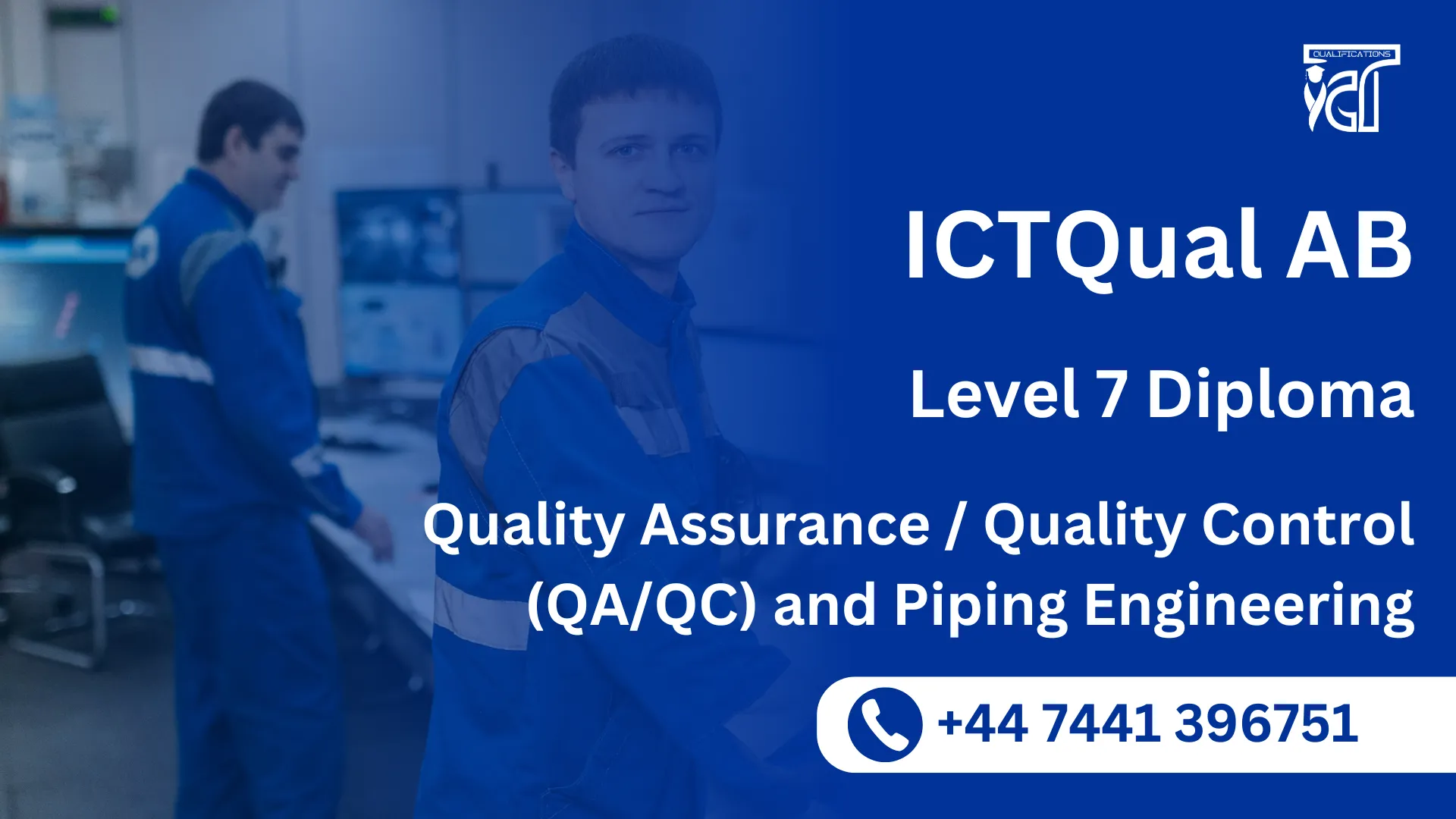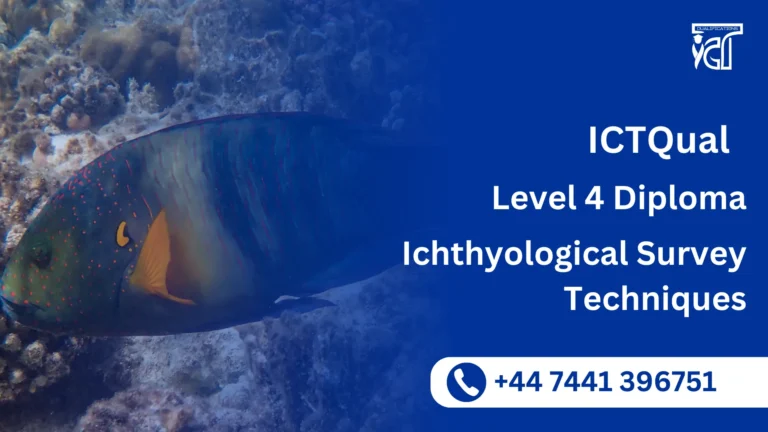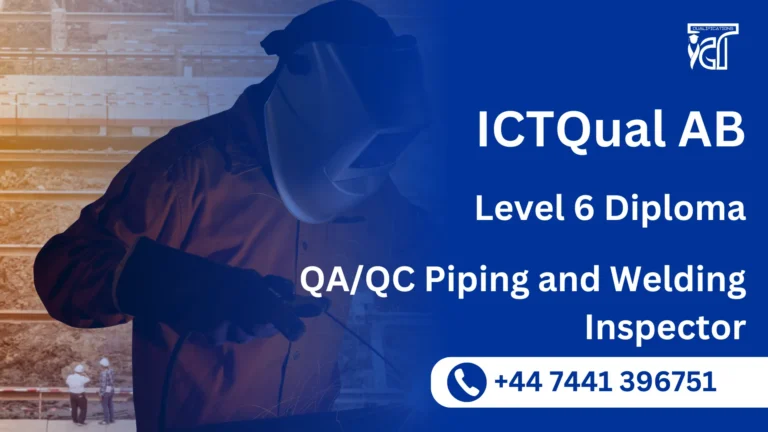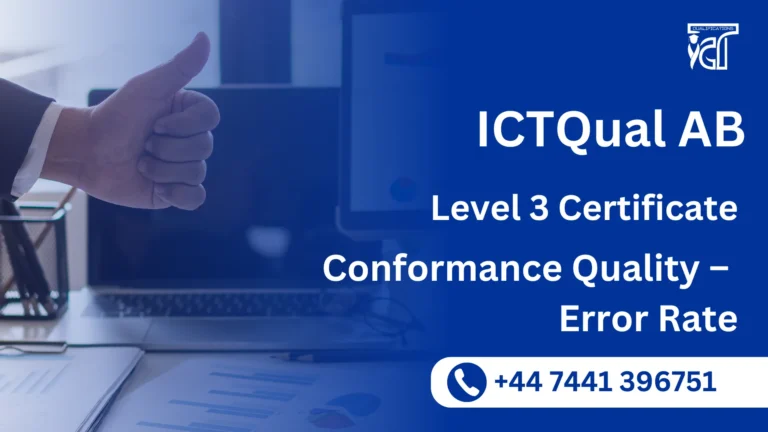The ICTQual AB Level 7 Diploma in Quality Assurance / Quality Control (QA/QC) and Piping Engineering is an advanced qualification designed for experienced professionals seeking mastery in inspection, quality management, and piping engineering. This program integrates technical expertise with strategic quality practices, preparing learners to take on senior roles in industries where piping systems and welding integrity are critical to project success.
Learners will explore advanced QA/QC methodologies, international codes and standards, and specialized piping engineering concepts. The course emphasizes defect analysis, risk management, and compliance strategies, ensuring participants can lead inspection teams, implement quality systems, and oversee complex industrial projects. By combining engineering knowledge with quality assurance frameworks, this diploma equips professionals to deliver excellence in safety, reliability, and efficiency.
In addition to technical depth, the program develops leadership and decision‑making skills. Learners will gain the ability to design inspection plans, manage quality audits, and apply advanced problem‑solving techniques to real‑world challenges. The integration of piping engineering principles with QA/QC practices ensures graduates are capable of bridging technical and managerial responsibilities in high‑stakes environments.
Completing the ICTQual AB Level 7 Diploma in QA/QC and Piping Engineering positions learners for senior inspection, engineering, and quality management roles across global industries such as oil and gas, construction, power generation, and manufacturing. It also provides a pathway to specialized certifications and leadership opportunities, empowering professionals to shape quality standards and drive organizational success at an international level.
ICTQual AB Level 7 Diploma in Quality Assurance / Quality Control (QA/QC) and Piping Engineering
This qualification, the ICTQual AB Level 7 Diploma in Quality Assurance / Quality Control (QA/QC) and Piping Engineering, consists of 6 mandatory units.
| Sr# | Unit Title |
| 1 | Executive Quality Assurance Strategy & International Regulatory Frameworks |
| 2 | Complex Multi‑Disciplinary Piping Engineering Projects: Planning & Execution |
| 3 | Innovative Quality Technologies: Digital Inspection, IoT & Smart NDT Systems |
| 4 | Enterprise Risk Management, Resilience Planning & Incident Response |
| 5 | Change Management, Knowledge Transfer & QA/QC Organisational Development |
| 6 | Master‑Level Research Project & Case Study in QA/QC and Piping Engineering |
Learning Outcomes for the Study Units:
Executive Quality Assurance Strategy & International Regulatory Frameworks
By the end of this unit, the learner will be able to:
- Design and implement enterprise-level quality assurance strategies aligned with global objectives
- Interpret and apply international regulatory frameworks, codes, and standards across engineering projects
- Lead the development of corporate quality policies and governance structures
- Integrate regulatory compliance into strategic quality planning and operations
- Assess the impact of international laws and cross-border quality standards on global project delivery
Complex Multi-Disciplinary Piping Engineering Projects: Planning & Execution
By the end of this unit, the learner will be able to:
- Manage the full lifecycle of complex piping engineering projects across multiple disciplines
- Lead project planning, resource allocation, budgeting, and timeline execution at an enterprise level
- Coordinate engineering, quality, safety, and procurement teams on high-value projects
- Apply advanced tools and methodologies to control project quality and mitigate technical risks
- Deliver integrated project outcomes that meet global engineering standards and stakeholder expectations
Innovative Quality Technologies: Digital Inspection, IoT & Smart NDT Systems
By the end of this unit, the learner will be able to:
- Evaluate and implement emerging quality technologies in engineering environments
- Apply digital inspection tools and Internet of Things (IoT) integration to monitor system health
- Use smart NDT (Non-Destructive Testing) systems for real-time data acquisition and defect detection
- Lead digital transformation initiatives within QA/QC departments
- Optimise inspection workflows using advanced analytics and smart sensors
Enterprise Risk Management, Resilience Planning & Incident Response
By the end of this unit, the learner will be able to:
- Develop enterprise-wide risk management frameworks for quality and engineering projects
- Design and implement resilience plans that ensure operational continuity
- Manage high-impact incidents and lead root cause investigations across complex systems
- Align risk governance with strategic business goals and international compliance standards
- Lead post-incident recovery and continuous improvement initiatives
Change Management, Knowledge Transfer & QA/QC Organisational Development
By the end of this unit, the learner will be able to:
- Drive cultural change in QA/QC organisations through structured change management models
- Develop and lead knowledge transfer programmes across technical and leadership teams
- Align organisational development with quality strategy, stakeholder needs, and industry innovation
- Support workforce transformation through mentoring, coaching, and training
- Implement scalable systems for talent retention, leadership growth, and quality capability building
Master-Level Research Project & Case Study in QA/QC and Piping Engineering
By the end of this unit, the learner will be able to:
- Conduct in-depth research on a critical issue within QA/QC or piping engineering
- Analyse complex data and apply research findings to real-world industrial scenarios
- Present a comprehensive case study that demonstrates critical thinking, innovation, and strategic insight
- Evaluate the implications of research on future engineering practices and quality systems
- Communicate research outcomes clearly to stakeholders, executives, and industry professionals
The ICTQual AB Level 7 Diploma in QA/QC and Piping Engineering equips professionals with advanced technical knowledge and strategic quality management skills. It is designed for experienced learners aiming to lead inspection teams, manage complex projects, and contribute to global industry standards.
Advanced Technical Expertise
- Mastery of QA/QC methodologies in piping and welding inspection
- In‑depth knowledge of international codes and standards (ASME, API, ISO)
- Expertise in defect analysis, risk management, and compliance strategies
- Ability to design and implement advanced inspection frameworks
- Integration of piping engineering principles with quality assurance practices
Career Advancement
- Preparation for senior roles such as QA/QC manager, piping engineer, or quality director
- Enhanced employability in oil and gas, construction, power generation, and manufacturing sectors
- Opportunities to lead inspection teams and manage quality systems in complex projects
- Recognition as a high‑level qualification supporting global career mobility
- Pathway to consultancy, auditing, and leadership positions in QA/QC and engineering
Professional Skills Development
- Strengthened leadership and decision‑making capabilities
- Advanced problem‑solving skills for industrial challenges
- Proficiency in managing audits, compliance programs, and inspection documentation
- Ability to mentor and train junior inspectors and engineers
- Development of strategic communication and project management skills
Organizational Impact
- Contribution to organizational excellence through improved safety, compliance, and efficiency
- Reduction of risks and defects in large‑scale industrial projects
- Strengthening of organizational reputation through adherence to global standards
- Support in achieving cost savings and operational reliability
- Alignment with international best practices that drive long‑term success
The ICTQual AB Level 7 Diploma in QA/QC and Piping Engineering is designed for highly experienced professionals who aspire to take on senior leadership roles in inspection, quality management, and piping engineering. This qualification is suitable for individuals seeking mastery of advanced QA/QC practices, international standards, and strategic project management.
Experienced Professionals
- Senior QA/QC inspectors, engineers, or managers with significant industry exposure
- Individuals already responsible for overseeing inspection teams or managing quality systems
- Professionals aiming to consolidate their expertise with an internationally recognized qualification
- Candidates motivated to lead complex projects in oil and gas, construction, or power generation
- Learners seeking advanced knowledge of piping engineering integrated with QA/QC practices
Career Advancers
- Professionals aspiring to move into senior management or consultancy roles in QA/QC and engineering
- Learners seeking to enhance their employability in global industries with advanced certification
- Candidates motivated to progress toward director‑level or strategic leadership positions
- Individuals aiming to expand their influence in organizational quality standards and compliance
- Those preparing for specialized certifications aligned with ASME, API, and ISO frameworks
International Participants
- Learners seeking qualifications recognized across global industries and multinational projects
- Professionals aiming to work in international markets where QA/QC and piping engineering expertise is critical
- Candidates motivated to gain exposure to global best practices and compliance systems
- Individuals seeking to strengthen their profile for overseas employment and consultancy opportunities
- Learners who value advanced technical English communication skills for international collaboration
Strategic Thinkers
- Professionals interested in bridging technical expertise with leadership and decision‑making skills
- Learners motivated to design inspection frameworks and manage quality audits at organizational level
- Candidates aiming to contribute to safety, compliance, and efficiency in high‑stakes environments
- Individuals seeking to mentor and train junior inspectors and engineers
The ICTQual AB Level 7 Diploma in QA/QC and Piping Engineering represents one of the highest levels of professional achievement in inspection and quality management. It equips learners with advanced expertise, positioning them for senior leadership roles, international recognition, and specialized certifications.
Higher-Level Qualifications
- Pathway to specialized certifications such as ASME, API, ISO, and IRCA Lead Auditor programs
- Eligibility for advanced professional memberships in engineering and quality associations
- Opportunities to pursue executive diplomas or leadership programs in project management and industrial engineering
- Preparation for research, consultancy, or academic contributions in QA/QC and piping engineering
- Access to continuous professional development programs aligned with global standards
Career Pathways
- Senior roles such as QA/QC Manager, Piping Engineer, Quality Director, or Technical Consultant
- Opportunities to lead inspection teams and manage quality systems in multinational projects
- Progression into executive management positions within oil and gas, construction, power generation, and manufacturing sectors
- Potential to establish independent consultancy services in QA/QC and engineering
- Development toward training and mentoring roles for future inspectors and engineers
International Opportunities
- Recognition of advanced skills across global industries requiring QA/QC and piping expertise
- Ability to work on international mega‑projects with compliance and inspection responsibilities
- Pathway to certifications that enhance mobility across countries and regions
- Opportunities to collaborate with global engineering firms and contractors
- Strengthened profile for overseas employment and consultancy leadership
Long-Term Professional Growth
- Foundation for continuous learning in advanced inspection technologies and quality management systems
- Preparation for strategic leadership roles influencing organizational safety, compliance, and efficiency
- Opportunities to contribute to shaping industry standards and global best practices
- Development of expertise that supports long‑term career stability and progression
- Potential to transition into thought leadership, publishing, or policy advisory roles in QA/QC and engineering
Entry Requirements
Learners must meet the following criteria to be considered for admission into the course:
- Age Requirement: Minimum age of 18 years at the time of enrollment
- Educational Background: Completion of a Level 6 Diploma or equivalent qualification in engineering, construction, or related technical fields
- Work Experience: Minimum of 3–5 years of relevant industry experience in QA/QC, welding, fabrication, or piping engineering
- English Language Proficiency: Good command of English for reading advanced technical materials, writing reports, and communicating in professional contexts
Register Now
Qualification Process
Qualification Process for the ICTQual AB Level 7 Diploma in Quality Assurance / Quality Control (QA/QC) and Piping Engineering
- Self-Assessment:
Begin by evaluating your eligibility to ensure you meet the qualification requirements, including work experience, knowledge, and language proficiency. - Registration:
Complete your registration by submitting the required documents, including a scanned copy of a valid ID, and paying the registration fee. - Induction:
An assessor will conduct an induction to confirm your eligibility for the course and explain the evidence requirements. If you do not meet the criteria, your registration will be cancelled, and the fee will be refunded. - Assignments & Evidence Submission:
Provide all assignments and the necessary evidence based on the assessment criteria outlined in the course. If you are unsure of the required evidence, consult with the assessor for guidance on the type and nature of evidence needed. - Feedback and Revision:
The assessor will review your submitted evidence and provide feedback. Evidence that meets the criteria will be marked as “Criteria Met,” while any gaps will be identified. You will be asked to revise and resubmit if needed. - Competence Evidence:
Submit final evidence demonstrating that all learning outcomes have been met. This evidence will be marked as “Criteria Met” by the assessor once it is satisfactory. - Internal Quality Assurance (IQA):
The Internal Quality Assurance Verifier (IQA) will review your evidence to ensure consistency, quality, and compliance with standards. - External Verification:
The IQA will submit your portfolio to ICTQUAL AB External Quality Assurance Verifiers (EQA) for final confirmation. The EQA may contact you directly to verify the authenticity of your evidence. - Certification:
Upon successful completion of all checks, ICTQUAL AB will issue your official certificate, confirming that you have attained the ICTQual AB Level 7 Diploma in Quality Assurance / Quality Control (QA/QC) and Piping Engineering







